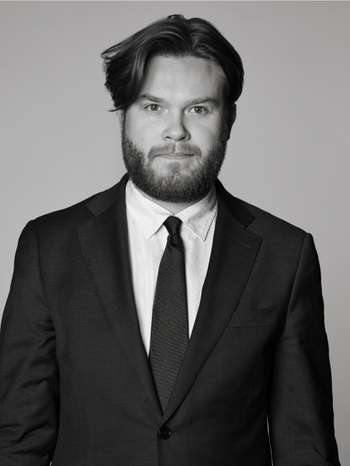Albert Edelfelt
Portrait of Ragnar, son of the artist Berndt Lindholm
Signed A. Edelfelt and dated 1875. Executed in Paris. Canvas 47 x 38 cm.
Exhibitions
Finska Konstföreningens exposition, Helsinki, Finland, 1879, cat. no 25a.
Literature
Werner Söderhjelm, "Profiler", Helsinki, Holger Schildts, 1923. Mentioned on p 232 f.
Jac Ahrenberg, "Människor som jag känt : personliga minnen, utdrag ur bref och anteckningar", part III, Helsinki, 1908. Mentioned p. 38 ff. Listed in the catalogue (III) as no 63 p. 19.
Bertel Hintze, "Albert Edelfelt", vol I, Söderström & Co, Helsinki, 1942, mentioned and illustrated in b/w p. 75.
"Albert Edelfelt 1854-1905", Ateneum Art Museum, Helsingfors, 2004. Listed in the expography under the year 1879 as no 25a "Portrait of a child" 1875, p. 33.
More information
With Albert Edelfelt Finnish art became a European affair. Edelfelt was quickly recognised by an international art scene and moved, as is visible in his paintings, between a local and a continental life. Today Edelfelt is considered one of the most beloved artists in Finnish art history. His subjects demonstrate an artistic range that alternates between historical painting and prestigious society portraits to scenes depicting groups of people in the Finnish archipelago.
Thanks to a state scholarship the young artist Edelfelt was given the chance to leave Helsinki and travel around Europe. His journey first took him to the art academy in Antwerp and later on to the epicentre of art at the time – Paris. In Paris there was a growing colony of Finnish and Swedish artists, including Berndt Lindholm, Adolf von Becker and Ernst Josephson.
The first impressionist exhibition was held in 1874, the same year that Edelfelt arrived in Paris. However, he wasn’t tempted by the famous, free painting schools that many of the other Nordic painters sought. His ambivalent attitude towards the impressionists made him seek training more characterised by academic historical painting. In 1874 he enrolled at Jean-Louis Gérôme’s studio at the Ecole Nationale des Beaux-Arts. Bertel Hintze has described how Edelfelt was first met by mockery at Gérôme’s studio, but then invited everyone for the obligatory round of wine and cigars, before, to general cheers, singing a Swedish sailor’s song. He was henceforth accepted within this new circle of friends. In time Edelfelt came to establish a large international network of artists, collectors, writers and cultural personalities in a Paris that was bursting with life.
Yet success did not come immediately. Edelfelt’s first composition "Rokokodam", executed in Paris in 1874, was met by far from enthusiastic critics back home in Finland. Hintze describes the situation as follows: "Edelfelt was deeply upset by the public defeat he had suffered. In order to restore himself he sent to the Salon in spring 1875 a portrait, painted at the start of the year, of Berndt Lindholm’s boy; his melancholy increased to despair when the portrait was rejected by the jury. According to Jac. Ahrenberg (who at this time resided in Paris) he considered it a complete train wreck and was sorry, as the first shock had subsided, that he had not been sensible and stayed at university to become a lecturer in Greek who only painted on Sundays." Despite this great disappointment Edelfelt, who was just twenty-three years old, would two years later have his big breakthrough with the painting "Drottning Blanka", which was accepted at the Salon in 1877. The painting, which was praised by the critics, would become one of the most recognised artworks in the Nordic countries through its reproductions.
In the charming portrait of the child Ragnar Lindholm, the little two-year-old is portrayed against a dark, almost black background. It is reminiscent of more traditional historical painting, a notion which recurs with the subject of Drottning Blanka. At the same time it is possible to see how the new artistic movements have impacted the artist in his technique and attitude. His brushstrokes are broad and energetic, the colour dynamic and the light lively. The portrait should be considered as an important step on the way towards the celebrated and praised paintings that Edelfelt executed in the period that followed.
Artist
Albert Edelfelt is considered one of Finland's greatest artists of the 19th century. After studying in Antwerp and Paris, he settled in France, where he received several exhibition medals and was honored with the Legion of Honour, notably for the famous portrait of Pasteur. He was also summoned by Alexander III to St. Petersburg to portray the Tsar's children. Edelfelt often returned to themes from Finnish history, such as his illustrations for 'The Tales of Ensign Stål.'
Edelfelt's works display an artistic breadth that ranges from everyday life in the Finnish archipelago to prestigious society portraits and historical paintings. In his depictions of everyday life, he managed to merge traditional academic painting with the new techniques of plein air painting, which achieved great success in France. The painting 'The Funeral of a Child' was awarded a third-class medal at the annual Salon in Paris in 1880, marking the most significant international success for Finnish painting at the time.
Albert Edelfelt is primarily represented in Ateneum in Helsinki, but also in the National Museum in Stockholm, as well as museums in Copenhagen, Luxembourg, and Paris.
Read more



























































